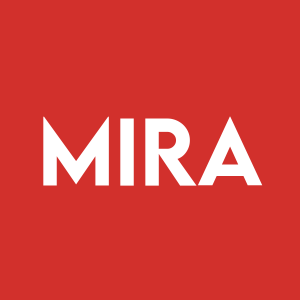Mira Pharmaceuticals Announces DEA Rules MIRA-55, a Novel Oral Pharmaceutical Marijuana Analog, Is Not Classified as a Controlled Substance
Rhea-AI Summary
Mira Pharmaceuticals announced that its novel drug MIRA-55 has been ruled by the DEA as not being a controlled substance. This decision eliminates regulatory barriers for manufacturing, research, and commercialization. MIRA-55, aimed at treating neuropathic pain, anxiety, and cognitive decline, shows promise in enhancing memory and cognitive performance without the adverse effects associated with THC in marijuana. The drug also demonstrates stable anti-anxiety effects and reduced intoxicating effects, providing a significant advantage over traditional cannabis. With access to large neurological and cannabis markets, MIRA-55 represents a promising value for the company.
Positive
- DEA ruling: MIRA-55 not classified as a controlled substance, removing regulatory barriers.
- MIRA-55 shows 100% improvement in memory in pre-clinical studies.
- Stable anti-anxiety effects compared to THC's biphasic response.
- Reduced intoxicating effects due to lower CB1 receptor potency.
- Potential access to $90B neurological and $30B cannabis markets.
- Promising alternative for anxiety and cognitive impairment with fewer side effects.
Negative
- Pre-clinical stage: MIRA-55 is still in early development stages, implying potential risks in clinical trials.
- No human trial results yet: Efficacy and safety in humans remain unproven.
News Market Reaction – MIRA
On the day this news was published, MIRA gained 3.39%, reflecting a moderate positive market reaction.
Data tracked by StockTitan Argus on the day of publication.
Ruling removes potential complications for manufacturing, pre-clinical development, IND submission, clinical development, and ultimately commercialization.
MIRA-55 is under investigation for treating adult patients suffering from neuropathic pain as well as anxiety and cognitive decline often associated with early-stage dementia. Unlike THC (the principal psychoactive compound in marijuana), which can impair cognitive function, MIRA-55 has demonstrated in pre-clinical studies that it can improve memory by
Key Advantages of MIRA-55 Over Marijuana:
- Non-Controlled Substance: The DEA's ruling confirms that MIRA-55 is not a controlled substance, offering a significant regulatory advantage over marijuana, which is currently classified as a Scheduled drug. This status facilitates more accessible research and development processes and reduces legal and logistical barriers to further studies and eventual commercialization.
- Cognitive Enhancement: MIRA-55 has shown promising results in enhancing memory and cognitive performance in preclinical models. This is in stark contrast to marijuana, which is known to impair cognition and memory. Long-term marijuana use can impair thinking, memory, and learning functions, particularly when usage begins in adolescence. Studies have shown that heavy marijuana users can experience significant I.Q. declines and cognitive deficits.
- Stable Anti-Anxiety Effects: Unlike THC found in marijuana, which exhibits a biphasic effect (anti-anxiety at low doses and pro-anxiety at high doses), MIRA55 demonstrates a monophasic dose-response in pre-clinical models, indicating a more stable and consistent anti-anxiety effect across its dosage range. Furthermore, marijuana use has been linked to mental health problems such as depression, anxiety, and an increased risk of psychosis and schizophrenia. Higher THC levels in modern marijuana strains increase the risk of addiction, heart problems, and lung issues.
- Reduced Intoxicating Effects: MIRA-55 exhibits lower potency at the CB1 receptor, which is responsible for the psychoactive effects of THC, while maintaining higher activation of the CB2 receptor. This suggests that MIRA-55 may deliver therapeutic benefits with minimal intoxicating effects. Unlike marijuana, MIRA-55 aims to provide these benefits without the associated adverse effects such as temporary hallucinations, paranoia, and exacerbating symptoms in patients with schizophrenia.
"We are thrilled with the DEA's decision, which underscores the potential of MIRA-55 as a groundbreaking therapeutic candidate," said Erez Aminov, Chairman & CEO of MIRA Pharmaceuticals. "This ruling allows us to focus on MIRA-55's unique cognitive and anxiety benefits. With access to
"Anxiety disorders affect around 40 million
About MIRA Pharmaceuticals, Inc.
MIRA Pharmaceuticals, Inc. (NASDAQ: MIRA) is a pre-clinical-stage pharmaceutical development company with two neuroscience programs targeting a broad range of neurologic and neuropsychiatric disorders. MIRA holds the exclusive
In addition, MIRA's novel oral pharmaceutical marijuana analog, MIRA-55, is currently under investigation for treating adult patients suffering from neuropathic pain as well as anxiety and cognitive decline, often associated with early-stage dementia. MIRA-55, if approved by the FDA, could mark a significant advancement in addressing various neuropsychiatric, inflammatory, and neurologic diseases and disorders. The
Additional information about the Company is available at: www.mirapharmaceuticals.com.
Ketamir-2 and MIRA-55 are in early-stage preclinical development. There is no assurance that the products will proceed through development or will receive FDA approval for marketing.
Cautionary Note Regarding Forward-Looking Statements
This press release and the statements of the Company's management related thereto contains "forward-looking statements," which are statements other than historical facts made pursuant to the safe harbor provisions of Section 27A of the Securities Act of 1933, as amended, and Section 21E of the Securities Exchange Act of 1934, as amended. These statements may be identified by words such as "Aims," "anticipates," "believes," "could," "estimates," "expects," "forecasts," "goal," "intends," "may," "plans," "possible," "potential," "seeks," "will," and variations of these words or similar expressions that are intended to identify forward-looking statements. Any statements in this press release that are not historical facts may be deemed forward-looking. These forward-looking statements include, without limitation, statements regarding MIRA-55's potential in treating certain mental health conditions or neuropathic pain and statements regarding the timing for the Company's preclinical studies and the filing of an IND for MIRA-55. Any forward-looking statements in this press release are based on the Company's current expectations, estimates and projections only as of the date of this release and are subject to a number of risks and uncertainties (many of which are beyond the Company's control) that could cause actual results (including the anticipated benefits of MIRA-55 and the pre-clinical and clinical pathway for MIRA-55 as discussed herein) to differ materially and adversely from those set forth in or implied by such forward-looking statements. These and other risks concerning the Company's programs and operations are described in additional detail in Annual Report on Form 10-K for the year ended December 31, 2023 and other SEC filings, which are on file with the SEC at www.sec.gov and the Company's website at https://www.mirapharmaceuticals.com/investors/sec-filings. The Company explicitly disclaims any obligation to update any forward-looking statements except to the extent required by law.
![]() View original content:https://www.prnewswire.com/news-releases/mira-pharmaceuticals-announces-dea-rules-mira-55-a-novel-oral-pharmaceutical-marijuana-analog-is-not-classified-as-a-controlled-substance-302158026.html
View original content:https://www.prnewswire.com/news-releases/mira-pharmaceuticals-announces-dea-rules-mira-55-a-novel-oral-pharmaceutical-marijuana-analog-is-not-classified-as-a-controlled-substance-302158026.html
SOURCE MIRA Pharmaceuticals, Inc.







